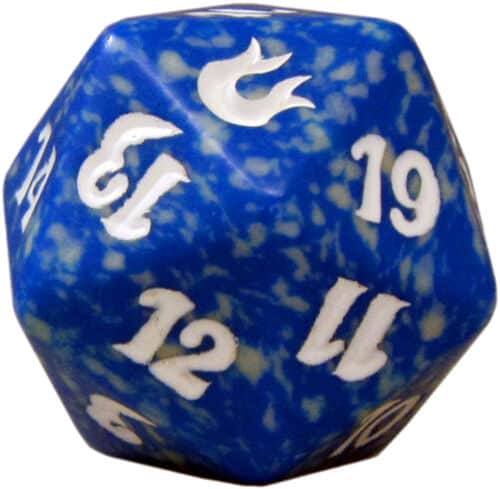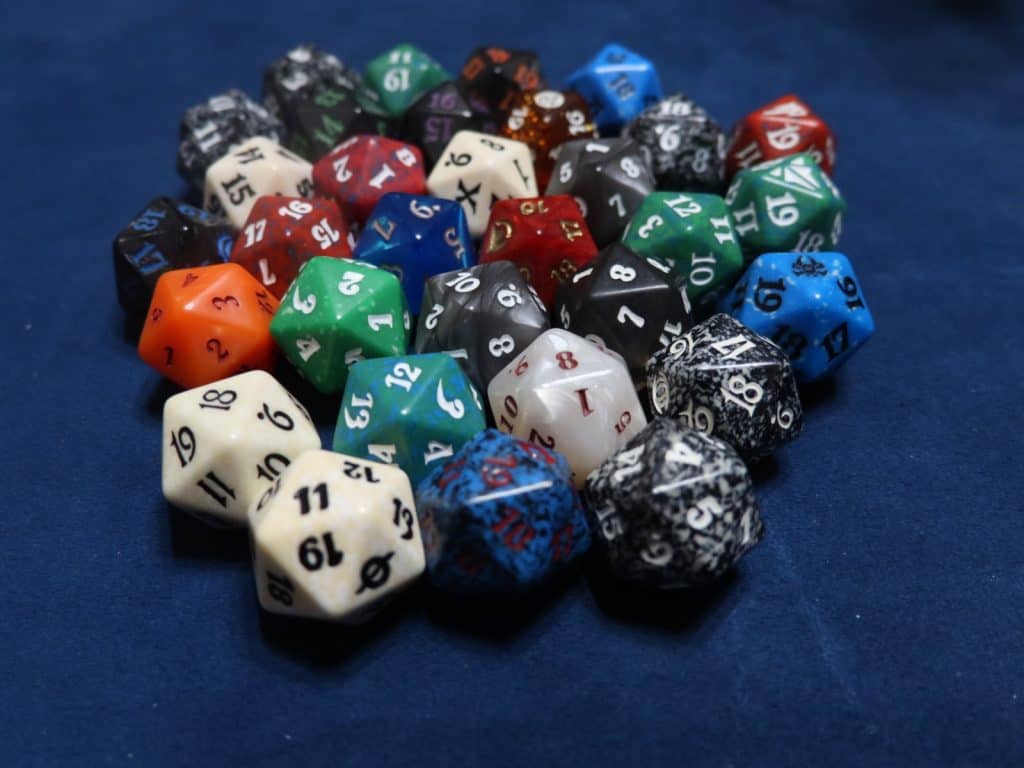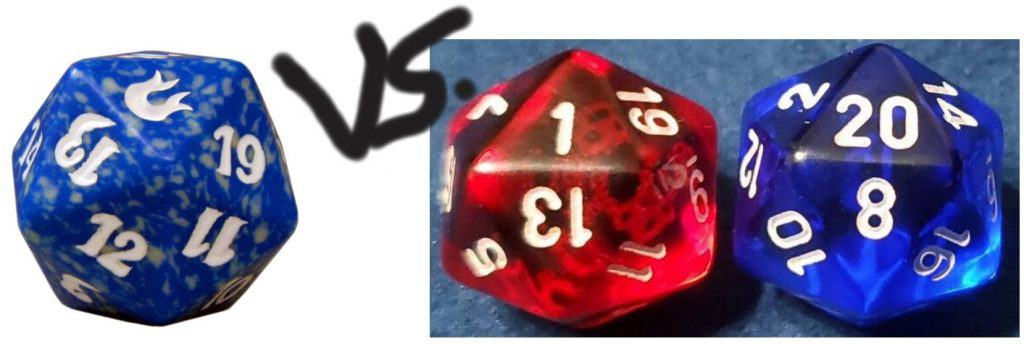The first time I sat down to a D&D game, the obsession with having multiple sets of dice was something that seemed a bit odd – it not outright baffling. Oh what a sweet naïve summer child I was! Dice are a huge part of tabletop RPGs and as owner of so many different sets of D20 dice or full D6 and D20 sets, a good dice discussion is something I now have plenty of opinions on.
Which was why I was surprised when someone brought up the use of a spindown die instead of a d20. I had never even heard of such a thing, though in fairness, Braden is the local Magic: The Gathering (MTG) expert among us.
After having the difference explained to me, doing some serious research, and reaching out to other tabletop RPG players and fans, the consensus seems to be that the two are definitely not interchangeable and that it is a bad idea to use a spindown in place of a conventional d20.
MTG’s spindown dice are specifically designed for counting, wrapping numbers sequentially around a 20-sided die, and are not designed for balanced dice rolls. Traditional 20-sided dice (d20) intermix low and high numbers, place opposing numbers on opposite sides of the die (such as 1 and 20, 4 and 17, or 10 and 11), and are balanced to provide all numbers an equal chance to roll.
So is conventional wisdom right here, or is there more to the story?

What Are Spindown Dice?
The biggest thing to look at right away is the fact that the spindown dice are not actually designed to be dice. Yes, they look like a die, roll like a die, and are even called dice, but that is to fit in with the gaming aesthetic that so many of us enjoy while around the table.
I mean who really wants a cardboard counter? Seriously.
But that’s the thing. A spindown die is just that: it’s a counter. A placeholder. The numbers are in sequential order rolling around the die not because that makes sense when trying to randomize a roll (it doesn’t) but because it’s there to keep track of a count.
The count in question when Wizards of the Coast debuted these in the Beatdown Box Set in 2000 was MTG’s life total. Since most non-Commander games start at 20 life, a 20-sided die provided an easy, durable, and portable way for players to track and display how much life they have throughout a game.
While the utility of spindowns has been expanded to similar counter roles within and outside of Magic since then, the fact remains that these were never designed to be rolled. The numbers aren’t separated and interspersed in a way that is balanced because you’re supposed to manually spin down the die from 20 to 1.
While some might still argue that “It’s 5% chance for any number to roll either way” there’s also really good reason to believe this logic is terribly wrong.

Are Spindown Dice Random?
While many people might be surprised to learn this, especially if they have a background in statistics or physics, the difference in design between a spindown die and a conventional d20 can cause serious problems – especially in regards to fairness when rolling during a tabletop campaign.
But wait, since both have 20 numbers spread out over 20 sides, how can there actually be a major difference?
Great question, and here are the answers, with major focus on why the spindown die just isn’t the same as its d20 counterpart.
1: It’s Easier to Control the Spin of a Spindown d20
I talked to multiple people who have played both MTG and games like Pathfinder or D&D for years. From several who experimented with dice, there was a general consensus that it was easier to control the spin on a spindown die than it was with a d20.
A major reason for this could be that since the spindown die is meant to be used as a marker, the same effort wasn’t put into balancing it perfectly when manufactured because no one was (in theory) going to be rolling it.
You might not find this to be true on every spindown d20, but it is comparatively easy to find one that will suit your needs if so inclined.
2: Rolling a “Side” Gives the Same Effect as a Controlled Spin
Even if you weren’t perfect at forcing a die to roll the way you wanted, since the numbers on a spindown are sequential, you only have to get it close to your target for it to usually count. An 18 is still likely a success even if your goal was a 20. A 4 is likely a failure even if you were trying to get a 1 to botch.
In other words, even having just a little bit of control over what part of the dice rolled would allow a player or DM to usually cheat on a whim, barring a major screw up.
Braden was able to pretty consistently grab a random spindown out of his bag and roll above a 13 with no practice or preparation beforehand.
3: Imbalances in Spindown Dice Cause Drastic Streaks
Even if you went against real world experience for the theoretical to mathematically show that the chance of getting any one result was 5% regardless of which die was used, there’s still one major real world truth that causes a problem with that base assumption.
Virtually no die is perfectly balanced.
A very good die is close, to the point where for all real world purposes it might as well be considered balanced. However, since so many dice are imbalanced to some extent, what would be a minor problem on a d20 (since the good and bad numbers are spread out throughout the die) becomes a huge problem when using a Spindown die.
Since all the big numbers are in one area, all the middle numbers in another, and all the low numbers one the final section, that means any imbalance on the die that makes it more likely to roll a certain way will drastically alter how consistently a die is considered good or bad.
And that can easily be game breaking for a tabletop campaign.
You can see more great discussions on this topic here.
4: WotC Prohibits Rolling Spindown d20s During Competitive Events
Dungeons & Dragons: Adventures in the Forgotten Realms introduced cards requiring players to roll d20s into MTG’s tournament environments in 2021. Naturally, this raised some questions about whether spindown dice, released by Wizards of the Coast in their MTG products for over 20 years, were considered fair d20s.
The answer was a resounding no. To quote the article:
Spindown life trackers are prohibited. We’re not going to worry about it in casual play, but at Competitive REL, we expect the numbers to be distributed appropriately to reduce any potential for manipulating dice rolls. How easy they are to manipulate is a matter of debate, but with the wide array of other randomization methods available, keeping them out removes any potential appearance of impropriety.
Scott Larabee & Toby Elliott, Wizards of the Coast (WotC), July 19, 2021
If the company most responsible for putting spindown dice into circulation suggests they can be manipulated, that should tell you all you need to know.

Final Verdict: No Go for the Spindown Die as a Substitute D20
While I like having new dice as much as the next player, spindown dice are a counter, not a die, and that’s how they should stay. If you’re a MTG player, by all means, grab some good ones. They’re cool looking and I love the wrap around effect. For a free for all RPG one shot, I’d even allow them.
But for a conventional tabletop RPG campaign whether it is Dungeons & Dragons, Pathfinder, or any of the other amazing systems out there that require the use of a d20, you’ll want to go the conventional route. Don’t try to swap out your d20s unless you live for complaints, wild swings in success/failure rates, and all the other less than stellar things that can come up during a grindy campaign.
The traditional d20 is a classic RPG die for a reason, and that’s the one that you should go with anytime you need a randomized die roll.
Some Great Dice Picks:
Hey, there’s always a place in a player’s collection for more pretty dice. If you’re both a MTG and tabletop RPG player, this rings doubly true.
Whether you’re looking for more d20s for your campaign because your current collection has the terrible habit of betraying you, or because you don’t need a reason, shut up, you’ll find some excellent click-clack math rocks for your hoard at the links below.
Other Articles you may enjoy
- Best Feats for Players in 5E DnD
- Component Pouch Vs. Arcane Focus: What’s the Difference?
- How to Use Untap to Play Magic The Gathering Online
- How to Remotely Play Magic Spell Table
- Investigation Vs. Perception 5E DnD

Proud to embrace the locally created moniker of “Corrupt Overlord” from one of the all time great Lords of Waterdeep runs, Shane is one member of the Assorted Meeples crew and will be hard at work creating awesome content for the website. He is a long-time player of board games, one time semi-professional poker player, and tends to run to the quirky or RPG side of things when it comes to playing video games. He loves tabletop roleplaying systems like Dungeons & Dragons, Pathfinder, Werewolf, Fate, and others, and not only has been a player but has run games as DM for years. You can find his other work in publications like Level Skip or Hobby Lark.
